|
|
|
Sort Order |
|
|
|
Items / Page
|
|
|
|
|
|
|
| Srl | Item |
| 1 |
ID:
114047
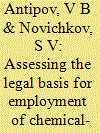

|
|
|
|
|
| Publication |
2012.
|
| Summary/Abstract |
The paper analyses the current state of the international law framework and national legislation in the sphere of legal regulation for chemical nonlethal weapons employed by the Armed Forces of the Russian Federation in order to ensure national security in the short and medium term.
|
|
|
|
|
|
|
|
|
|
|
|
|
|
|
|
| 2 |
ID:
189302
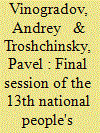

|
|
|
|
|
| Summary/Abstract |
This article examines the state-legal and socioeconomic development of the People's Republic of China in 2021 and analyzes some trends of state-building in China over the past 10 years. On the basis of reports presented at the final, fifth session of the 13th National People's Congress (March 2022), we cite the main work results of the State Council, the Standing Committee of the National People's Congress, the Supreme People's Court, and the Supreme People's Prosecutor's Office in 2021. The adopted laws testify to the strengthening of the state's role in social and economic life, as well as the attention of the Chinese law-making body to the legal safeguarding of sovereignty and protection of national interests in the international arena in the face of sanctions and increasing confrontation with the West.
|
|
|
|
|
|
|
|
|
|
|
|
|
|
|
|
| 3 |
ID:
149795


|
|
|
|
|
| Summary/Abstract |
Today, India enjoys the status of a spacefaring state. It is the national space agency—the Indian Space Research Organization—which created the culture of self-reliant space technology through its space program achievements. Even though there are emergent private actors in addition to the national space agency, it is very difficult to realize their potential in space in India. Because the national space program is societal-centric and application-centric, space commercialization is constrained. Nevertheless, there is interest in overcoming these constraints and in enabling a role for private space actors in India. In such a scenario, legal regulations are required. Within this context, is the existing legal regulatory framework sufficient, and has India already considered a vital role to regulate private actors in space? Also, are there global influences? This article analyzes these queries.
|
|
|
|
|
|
|
|
|
|
|
|
|
|
|
|
| 4 |
ID:
073193
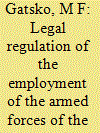

|
|
|
| 5 |
ID:
084755
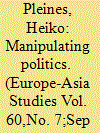

|
|
|
|
|
| Publication |
2008.
|
| Summary/Abstract |
This article focuses on political aspects of Ukrainian privatisation auctions during the presidency of Leonid Kuchma. It contributes to a discussion of the role of big national investors, or so-called oligarchs, in the context of a regime of competitive authoritarianism in Ukraine. A quantitative evaluation is made by means of an assessment of the values of the winning bids in the privatisation auctions under Kuchma and this is linked to a characterisation of the successful bidders in terms of their links to oligarchical networks. As a result distinct strategies of the Yushchenko and the Yanukovych governments towards auctions and towards oligarchs in general can be identified.
|
|
|
|
|
|
|
|
|
|
|
|
|
|
|
|
| 6 |
ID:
102088
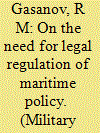

|
|
|
|
|
| Publication |
2010.
|
| Summary/Abstract |
The article reviews the current state of legal regulation in the Development of Methodologytion in shipbuilding in the interests of Russia's defense and security.
|
|
|
|
|
|
|
|
|
|
|
|
|
|
|
|
| 7 |
ID:
192516
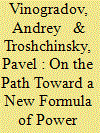

|
|
|
|
|
| Summary/Abstract |
This paper is devoted to the political, legal, and state development of the People's Republic of China from 2018 to early 2023. Based on reports presented at the first session of the 14th National People's Congress (March 2023), we examine the main performance indicators of the State Council, the Standing Committee of the National People's Congress, the Supreme People's Court, and the Supreme People's Procuratorate. We also analyze the personnel lineup of the 14th National People's Congress. This paper presents the main resolutions passed by the National People's Congress and its Standing Committee from 2018 to 2023 in the constitutional, criminal, civil, and administrative fields. The authors predict the development of the PRC's legal system in the near future. The Standing Committee of the National People's Congress has passed several important laws, including the Law on Countering Foreign Sanctions and amendments to the current Criminal Code that lower the age of criminal responsibility to 12 years. The law-enforcement and judicial systems have demonstrated a high degree of effectiveness in combating conventional crime. Overall, amid the volatile international situation and rising tensions in the South China Sea and Taiwan Strait, the Chinese leadership has focused on improving the combat readiness of the armed forces, strengthening national defense, and ensuring national security, including through the adoption of appropriate legal acts.
|
|
|
|
|
|
|
|
|
|
|
|
|
|
|
|
| 8 |
ID:
127665
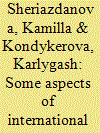

|
|
|
|
|
| Publication |
2013.
|
| Summary/Abstract |
The SCO has become an influential international structure today. Throughout its existence, the Organization has acted as an important mechanism for ensuring regional stability, as well as sustainable political and economic cooperation in the area in which it operates. Today the SCO is playing an increasingly efficient part in building the global security system, which is largely due to the new threats and challenges the world community now faces.
Kazakhstan's chairmanship in the SCO ended with a celebratory sitting of the Council of Heads of Member States held on 15 June, 2011 in Astana. At this meeting, the Astana declaration of the SCO's Tenth Anniversary was adopted, which states that during this time, the Organization has successfully advanced from its institutionalization to the establishment of efficiently functioning mechanisms of interaction in different spheres.
The SCO is a regional international organization, the main tasks of which are strengthening stability and security in the broad area that joins the states belonging to it, fighting terrorism, separatism, extremism, and drug trafficking, developing economic cooperation and energy partnership, and enhancing scientific and cultural interaction.
The SCO is an essentially new model of geopolitical integration that makes it possible to unite the interests of Central Asia, Russia, and China. This statement is based on the experience of the SCO member states that are pooling their efforts to oppose non-traditional threats to security in Central Asia-terrorism, flagrant fundamentalism, drug crimes, and separatism.
Of course, there are political reasons for unifying the countries within the SCO borne by the desire to ensure security in the region, while economic factors predominate in the traditional integration models. In this case, free trade is the springboard for forming a political union.
However, despite the prime importance of the political component in the SCO's activity, it is the economic factors that make it possible to oppose the negative trends in the life of the Central Asian region.
|
|
|
|
|
|
|
|
|
|
|
|
|
|
|
|
|
|
|
|
|